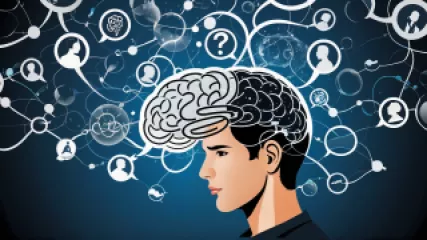Identifying Different Cognitive Distortion Types
What Are Cognitive Distortions?
Cognitive distortions are patterns of thinking that can negatively impact our mental health and well-being. They are irrational and distorted thoughts or beliefs that can lead to negative emotions and behaviors. These distortions can affect how we perceive ourselves, others, and the world around us.
Identifying different types of cognitive distortions is an essential step in understanding and challenging these negative thought patterns. By recognizing and addressing these distortions, we can work towards improving our mental well-being and creating healthier thought patterns.
The Importance of Recognizing Cognitive Distortions
Recognizing cognitive distortions is crucial because they can often be automatic and ingrained into our thinking. By becoming aware of these distortions, we can challenge and reframe them, which can lead to more realistic and positive thinking. Additionally, identifying cognitive distortions allows us to:
- Gain insight into our own thinking patterns
- Improve problem-solving skills
- Enhance self-awareness
- Develop healthier coping mechanisms
- Reduce anxiety and stress
- Improve relationships with others
Common Types of Cognitive Distortions
There are several common types of cognitive distortions that individuals may experience. It's important to note that people may exhibit a combination of these distortions, and they can vary in intensity from person to person. Here are some of the most prevalent types:
1. All-or-Nothing Thinking (Black-and-White Thinking)
All-or-nothing thinking refers to seeing things in extremes, without considering any middle ground. This type of distortion often leads to rigid thinking and an inability to see shades of gray. For example, someone with all-or-nothing thinking may believe that they are either a complete success or a total failure, without acknowledging any accomplishments or areas for improvement.
2. Overgeneralization
Overgeneralization involves making broad generalizations based on limited experiences or evidence. It is characterized by taking one negative event or outcome and applying it to all situations or aspects of life. For instance, if someone receives criticism on a project at work, they might overgeneralize and believe that they are incapable of succeeding in any future tasks.
3. Mental Filtering
Mental filtering occurs when individuals selectively focus on negative aspects while ignoring positive ones. This distortion can lead to a skewed perception of reality, where only the negative aspects of a situation are highlighted. For example, someone who receives numerous compliments on their appearance but focuses solely on one negative comment is engaging in mental filtering.
4. Jumping to Conclusions
Jumping to conclusions involves making assumptions or interpretations without sufficient evidence. This distortion includes two subtypes:
- Mind Reading: Assuming that we know what others are thinking or feeling, even without any concrete evidence.
- Fortune Telling: Predicting negative outcomes or catastrophizing without any logical basis.
5. Emotional Reasoning
Emotional reasoning refers to believing that our emotions reflect reality, regardless of any objective evidence. It involves using our feelings as evidence for the truth of a situation. For instance, if someone feels anxious about an upcoming presentation, they may conclude that they will undoubtedly fail, ignoring any evidence to the contrary.
6. Personalization
Personalization involves taking responsibility for events or situations that are beyond our control. It is the tendency to interpret external events as being directed towards oneself, even when there is no evidence to support this belief. For example, if someone's friend cancels plans, they may assume it is because of something they did wrong, rather than considering other possible reasons.
7. Catastrophizing
Catastrophizing involves magnifying the significance of negative events or outcomes and imagining the worst-case scenarios. This distortion often leads to excessive worry and anxiety. For instance, someone who receives a minor criticism at work may catastrophize and believe that they will lose their job as a result.
8. Should Statements
Should statements involve having rigid expectations of how things should be, both for ourselves and others. These statements often lead to feelings of guilt, frustration, and disappointment. For example, someone might constantly tell themselves, "I should always perform perfectly," setting unrealistic standards that are impossible to meet.
9. Discounting the Positive
Discounting the positive involves dismissing or downplaying positive experiences, qualities, or achievements. This distortion can lead to a lack of self-esteem and a negative self-image. For instance, someone who receives praise for their work may brush it off and believe that it doesn't count because it was an easy task.
10. Mind Reading
Mind reading is the assumption that we know what others are thinking or feeling, even without any concrete evidence. This cognitive distortion can lead to misunderstandings and strained relationships. For example, someone might believe that their friend is angry with them based on a perceived change in behavior, without actually discussing it with their friend.
Conclusion
Identifying different types of cognitive distortions is an important step in understanding and challenging these negative thought patterns. By recognizing when we engage in distorted thinking, we can work towards developing healthier and more realistic perspectives. Cognitive distortion coaching and support can help individuals become more aware of their own distortions and provide strategies for challenging and reframing them. With cognitive distortion awareness and education, we can intervene in our thought processes and cultivate more positive and balanced thinking patterns.






